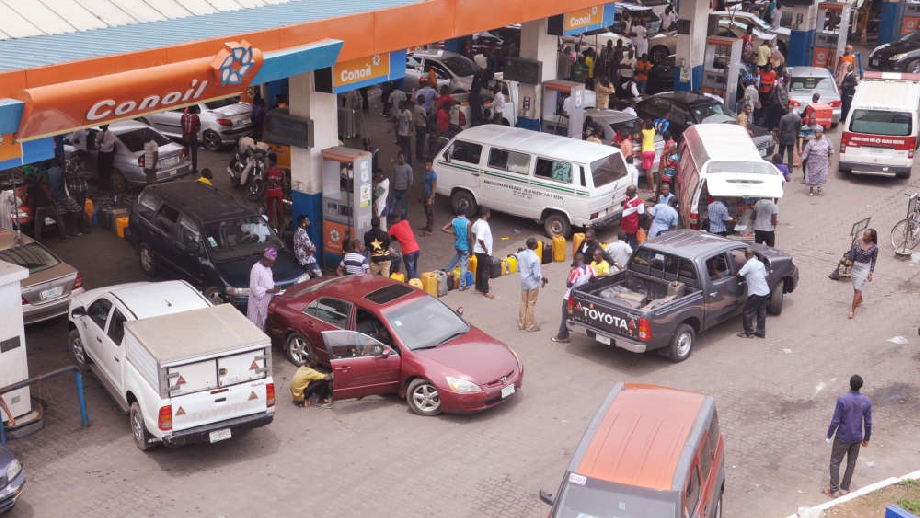
As Nigeria's petrol crisis deepens, the impact on businesses and the workforce has become more pronounced.
Rising fuel costs have trickled into every facet of life, affecting personal and organizational efficiency. The situation has led to an unprecedented rise in the cost of living, emotional stress, and operational challenges, reshaping workplace dynamics.
Nigeria removed its petrol fuel subsidy in May 2023 after an agreement at the highest level of government determined that the subsidy was unsustainable and inequitable. Fuel subsidies cost the government $9.7 billion in 2022 alone.
One year on, there is an emotional toll beyond the financial burden of fuel prices as employees struggle to plan their daily commutes. Workers are often uncertain how long it will take them to get home, adding to an already tasking workday.
“So, I mean, people's work hours really have shortened and worse is emotional stress. So, imagine you come to work, you're not sure how it is you're going to get home. You're not sure the time it's going to take you to get home, how long it's going to take you to get home”, Chinedum Ewuzie, a human capital development expert, said on Talking Figures, the business-focused show on 92.3 Nigeria Info FM Port Harcourt, outlining how workers and business owners are grappling with shortened work hours and increased emotional stress.
"So, the crisis is not just financial; it also affects the emotional well-being of employees and the overall health of organizations."
Strategic Responses: Is Flexibility Key?
"Some companies are implementing creative strategies to maintain efficiency in response to these challenges," Ewuzie said.
"One such approach is the introduction of flexible working hours. Employers recognize the toll that peak traffic hours - typically between 7-8 a.m. and 4-5 p.m. - take on employees, who are already dealing with an unreliable transportation system further strained by the ongoing fuel scarcity.
"So, I've seen some organizations implement flexible working hours. Companies are trying to avoid putting their staff during peak periods. The hours between 7 and 8 and probably between 4 and 5. Some companies are stating that if you arrive earlier than 7 a.m., you can leave by 3 p.m.," he added.
"As a result, certain businesses now allow staff to arrive earlier, before the rush hour begins, and leave by 3 p.m. to avoid the congested evening commute. This shift in scheduling helps reduce the emotional stress workers experience, giving them a sense of control over at least one part of their day," Ewuzie explains.
"Offering more flexible hours is seeing companies help employees conserve fuel and minimize time wasted in traffic."
The Hidden Costs of Keeping the Lights On
"Operating a business in this environment has never been more challenging. Business owners are dealing with the burden of rising costs, especially in keeping power generators running. The cost of powering a business even for a few hours, has skyrocketed," Ewuzie continued.
"Companies are now navigating higher operational costs, including soaring power costs that directly impact generator usage, forcing business owners to find innovative ways to stay operational while keeping their staff motivated and productive.
"The cost of power has gone up. The cost of powering your generator has gone up. So, it has created a very challenging environment to deal with all those variables in an organization," he said.
Consequently, many companies are forced to re-evaluate their operations, cutting back on certain hours or reducing their physical presence to save on fuel and power costs.
The ripple effect of these decisions is felt across the economy. The need for flexible hours and remote work arrangements is gaining traction as businesses attempt to navigate this crisis with a workforce that is both physically and emotionally tasked."
What Lies Ahead?
As Nigeria grapples with the petrol crisis, businesses and workers are adapting to a rapidly changing economic landscape. Flexible working hours, energy-saving strategies, and a focus on employee well-being are becoming critical for companies looking to stay competitive and maintain operational efficiency.
However, long-term solutions to the crisis will likely require more than just short-term adaptations. The government and private sector must collaborate to address the structural issues fueling the crisis, from inadequate infrastructure to the volatile fuel supply chain. Until then, businesses are adopting creative solutions to manage the immediate fallout of the ongoing fuel challenge.
As discussed on Talking Figures, it is a stark reminder that innovation in business operations is now a necessity, not a choice. The future of work in Nigeria may well depend on how companies continue to adapt to this new and challenging reality.


